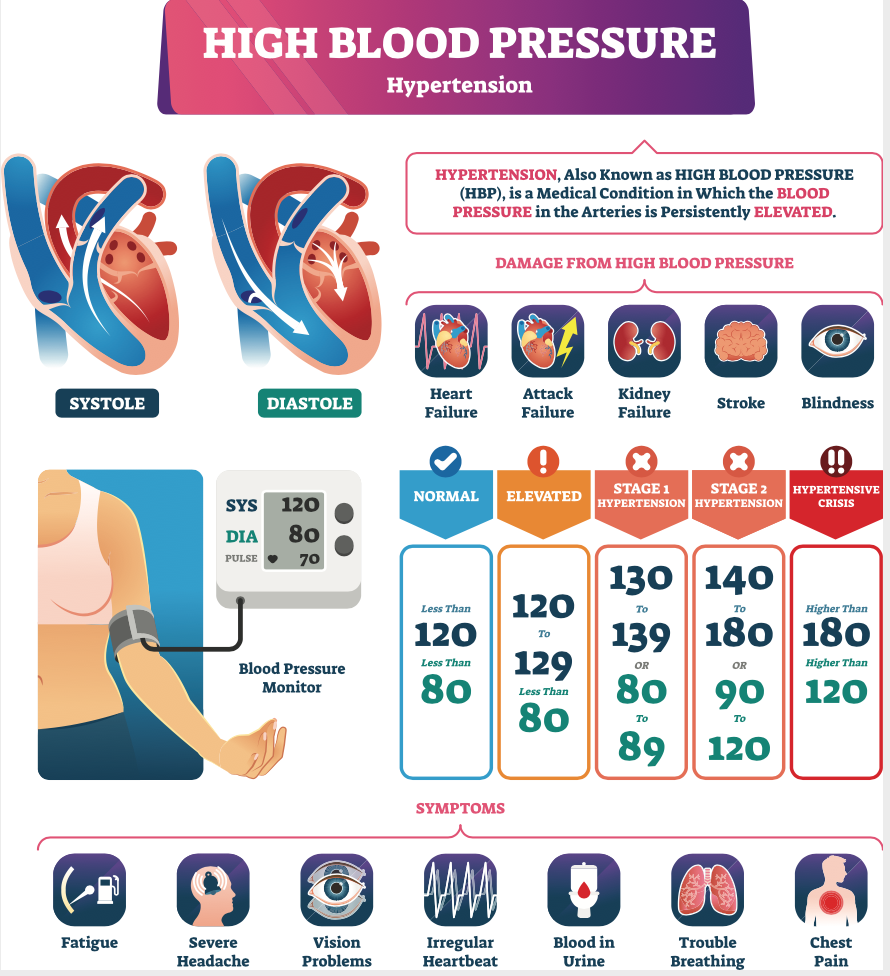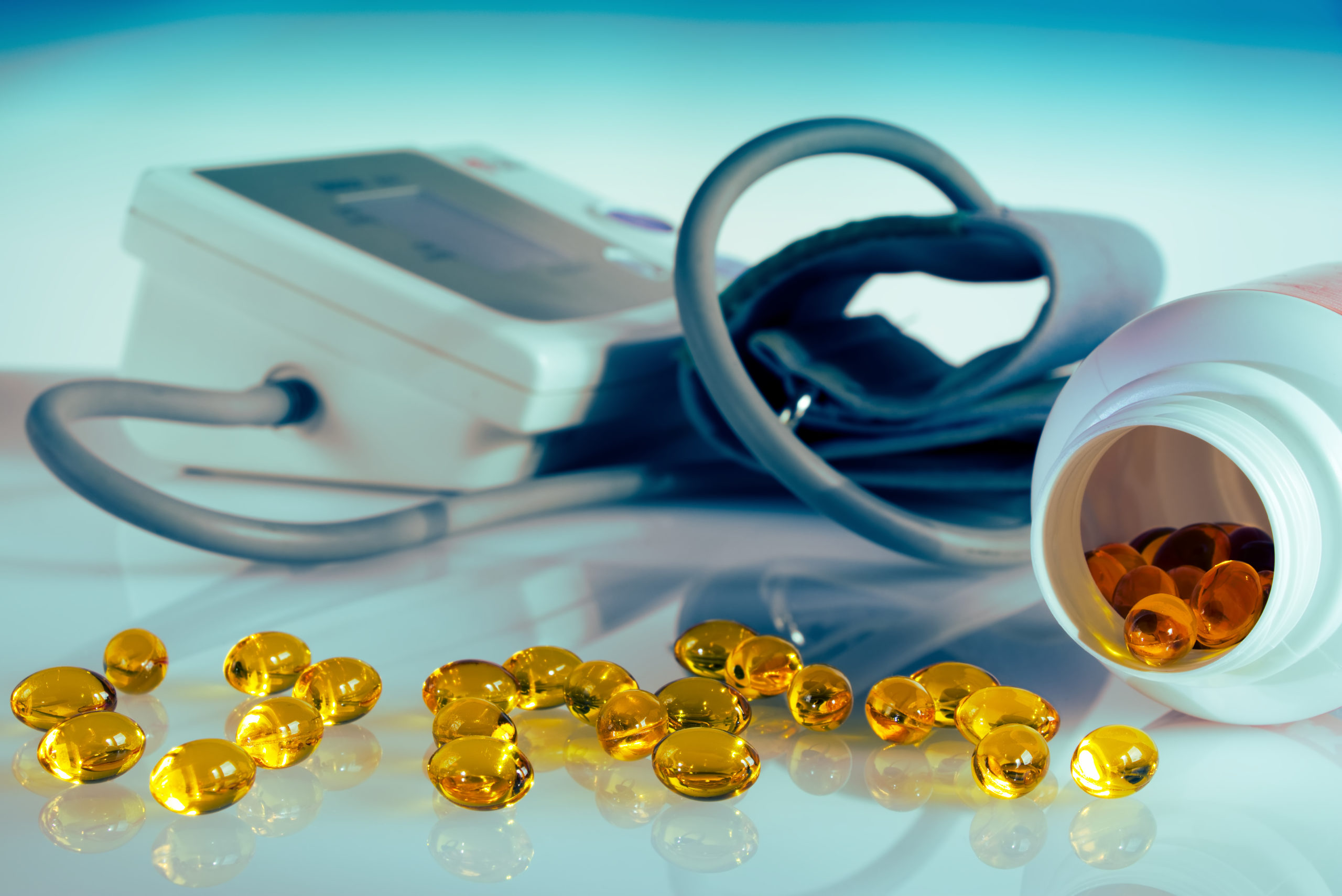Maintaining good blood pressure is important for heart health optimization. Healthy blood pressure can be achieved with a combination of lifestyle changes including a diet, exercise and lifestyle changes, and even certain personalized supplements.
In this blog post, I discuss what is considered high blood pressure, why you should care about managing your blood pressure, and the best supplements and vitamins for high blood pressure.
What Is Considered High Blood Pressure?
Blood pressure is one of the most important measures to help you monitor your general heart health and cardiovascular disease risk.
A blood pressure reading is made up of two numbers: systolic blood pressure and diastolic blood pressure. Blood pressure is measured in millimeters of mercury (mmHg) because mercury was used in the first accurate pressure gauges.
Systolic blood pressure is the first (or top number) number, and it measures the pressure of blood in the arteries when your heart beats. The second number is your diastolic blood pressure, the pressure of blood in your arteries between heartbeats.
High blood pressure, also known as hypertension, is a major risk factor for other vascular conditions. Long-term effects of consistently high blood pressure include increased risk of heart attack or stroke, heart failure and other cardiovascular diseases, vision loss, kidney failure, and even sexual dysfunction.
Recent guidelines by the American College of Cardiology/American Heart Association have updated and defined the categories of blood pressure and what is considered hypertension.1 You may belong to one of these blood pressure categories if your blood pressure consistently falls within these ranges:
Blood Pressure Categories:
- Normal: Below 120/80 mmHg
- Elevated: 120-129 mmHg systolic and < 80 mmHg diastolic
- Stage 1 Hypertension: 130-139 mmHg systolic or 80-89 mmHg diastolic
- Stage 2 Hypertension: ≥140 mmHg systolic or ≥90 mmHg diastolic
High blood pressure can develop due to a number of factors. Some people may naturally be at higher risk due to a family history of blood pressure. Other factors like diet, exercise, smoking, stress, pregnancy, healthcare access, and chronic conditions can increase your risk of having high blood pressure.2

Top Supplements for High Blood Pressure
Many of the best nutrients for high blood pressure come from foods and herbs that are commonly eaten in a healthy diet. But, sometimes a dietary supplement can help.
These are some vitamins, supplements, and herbs for high blood pressure that you may want to discuss with your doctor or registered dietitian, to see if they are right for you. Supplements should always be personalized and never one-size-fits-all.
Omega-3s
Omega-3 fatty acids are essential fats that our bodies cannot make in sufficient quantities, therefore they need to be obtained from foods like fish, seafood, and algae. The omega-3 fatty acids EPA and DHA help improve the dilation of blood vessels and increases nitric oxide production, which in turn lowers blood pressure.3
The NIH recommends limiting omega-3 intake to a maximum of 3 g/day, with up to 2 g/day coming from dietary supplements.4 Supplementing with 1 g or more of omega-3s daily can interfere with blood thinners and also increase the risk of Atrial Fibrillation. High-dose DHA supplements may increase LDL cholesterol levels. 5
Turmeric
Turmeric is one of the most popular herbs for blood pressure. It is a vibrant, yellow-orange root that is rich in curcumin, a polyphenol antioxidant that has many benefits for heart health. A meta-analysis of 11 studies found that taking turmeric/curcumin supplements for 12 weeks or longer could help improve systolic blood pressure.6 Turmeric and curcumin supplements can interfere with blood thinner medications.
Garlic
Garlic has many bioactive compounds that have antioxidant and anti-inflammatory properties beneficial for heart health. These compounds can support the relaxation of smooth muscle, relax blood vessels, and lower blood pressure. Studies find that taking garlic supplements significantly lower both systolic and diastolic blood pressure in adults.7 Individuals taking blood thinners should know that garlic supplements can interfere with these medications.
Lycopene
Lycopene is a carotenoid found in red and pink fruits and vegetables such as tomatoes, guavas, and red peppers. This carotenoid is an antioxidant that supports nitric oxide production and reduces inflammation to increase the elasticity of blood vessels. In a meta-analysis of 6 studies, a lycopene dose of 12 mg/day or higher was shown to lower systolic blood pressure. This effect was greatest in adults with a baseline systolic blood pressure >120 mmHg.8
Beetroot
Beetroot is a natural source of inorganic nitrates and can contribute to the availability of nitric oxide in the body. Initial studies have found that beetroot supplements may be effective in reducing both systolic and diastolic pressure.9 If you are currently on certain blood pressure medications or for erectile dysfunction, be aware that beetroot may interact with these medications.
Calcium
A top supplement for high blood pressure management includes calcium supplements. Calcium is needed to support the regular contraction and relaxation of blood vessels. A recent review found that calcium can reduce systolic and diastolic pressure in people with normal blood pressure, acting as a preventative against hypertension.10 Be sure to limit your calcium supplement dose to 500 mg or less at a time to reduce the risk of calcified arteries.11
L-arginine
L-arginine is an amino acid found in foods like poultry, red meat, fish and seafood, and dairy. In the body, L-arginine is necessary for the production of nitric oxide, which is needed for normal blood vessel dilation.
Studies find that L-arginine is effective in lowering both systolic and diastolic blood pressure in adults.12 Because this amino acid supports nitric oxide production, it may interfere with some blood pressure medications and medications for erectile dysfunction.
Supplements and Vitamins to Avoid with High Blood Pressure
Supplements, even if they are from natural herbs or vitamins can come with their own risks and should be used with caution. There are several supplements that should be avoided if you are taking any medications for high blood pressure including: 13, 14, 15
- Goldenseal
- St. John’s wort
- Licorice root
- Yohimbe
- Bitter orange
The best way to know which supplements are recommended for you is to speak with a medical professional who understands your health history and can make personalized recommendations.
Summary
When possible, it is best to meet your needs through a nutrient-dense, heart-healthy diet. If you do choose to incorporate supplements into your lifestyle to help with your blood pressure, any supplements you take should be individualized to your needs.
As a Preventative Cardiology Dietitian, I offer personalized 1 on 1 counseling services. During these sessions, I review your supplements, medications, lab work, medical history, and lifestyle and provide you with personalized guidance on which supplements would benefit you.To learn more about my services, book a discovery call to see how I can help you optimize your health and longevity.
References:
- Unger, T., Borghi, C., Charchar, F., Khan, N. A., Poulter, N. R., Prabhakaran, D., Ramirez, A., Schlaich, M., Stergiou, G. S., Tomaszewski, M., Wainford, R. D., Williams, B., & Schutte, A. E. (2020). 2020 International Society of Hypertension Global Hypertension Practice Guidelines. Hypertension, 75(6), 1334–1357.
- CDC. (2020, February 25). Know Your Risk for High Blood Pressure. Centers for Disease Control and Prevention. https://www.cdc.gov/bloodpressure/risk_factors.htm
- Bercea, C.-I., Cottrell, G. S., Tamagnini, F., & McNeish, A. J. (2021). Omega-3 polyunsaturated fatty acids and hypertension: a review of vasodilatory mechanisms of docosahexaenoic acid and eicosapentaenoic acid. British Journal of Pharmacology, 178(4), 860–877.
- Omega-3 Fatty Acids. (n.d.). Retrieved April 29, 2022, from https://ods.od.nih.gov/factsheets/Omega3FattyAcids-HealthProfessional/
- Omega-3 supplementation linked with atrial fibrillation risk: a meta-analysis. Cardiovasc J Afr. 2021;32(3):167.
- Hadi, A., Pourmasoumi, M., Ghaedi, E., & Sahebkar, A. (2019). The effect of Curcumin/Turmeric on blood pressure modulation: A systematic review and meta-analysis. Pharmacological Research: The Official Journal of the Italian Pharmacological Society, 150(104505), 104505.
- Ried, K. (2016). Garlic Lowers Blood Pressure in Hypertensive Individuals, Regulates Serum Cholesterol, and Stimulates Immunity: An Updated Meta-analysis and Review. The Journal of Nutrition, 146(2), 389S – 396S.
- Li, X., & Xu, J. (2013). Lycopene supplement and blood pressure: an updated meta-analysis of intervention trials. Nutrients, 5(9), 3696–3712.
- Jones, T., Dunn, E. L., Macdonald, J. H., Kubis, H.-P., McMahon, N., & Sandoo, A. (2019). The Effects of Beetroot Juice on Blood Pressure, Microvascular Function and Large-Vessel Endothelial Function: A Randomized, Double-Blind, Placebo-Controlled Pilot Study in Healthy Older Adults. Nutrients, 11(8). https://doi.org/10.3390/nu11081792
- Cormick, G., Ciapponi, A., Cafferata, M. L., Cormick, M. S., & Belizán, J. M. (2021). Calcium supplementation for prevention of primary hypertension. Cochrane Database of Systematic Reviews , 8, CD010037.
- Morelli, M. B., Santulli, G., & Gambardella, J. (2020). Calcium supplements: Good for the bone, bad for the heart? A systematic updated appraisal. Atherosclerosis, 296, 68–73.
- McRae, M. P. (2016). Therapeutic Benefits of l-Arginine: An Umbrella Review of Meta-analyses. Journal of Chiropractic Medicine, 15(3), 184–189.
- Asher, G. N., Corbett, A. H., & Hawke, R. L. (2017). Common Herbal Dietary Supplement-Drug Interactions. American family physician, 96(2), 101–107.
- Bui, L. T., Nguyen, D. T., & Ambrose, P. J. (2006). Blood pressure and heart rate effects following a single dose of bitter orange. The Annals of pharmacotherapy, 40(1), 53–57. https://doi.org/10.1345/aph.1G488
- Yohimbine. (2020). In LiverTox: Clinical and Research Information on Drug-Induced Liver Injury. National Institute of Diabetes and Digestive and Kidney Diseases.
